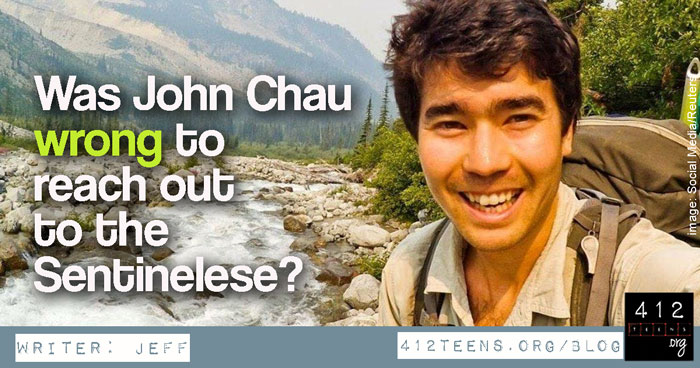Was John Chau wrong to seek the Sentinelese?

Posted by Jeff on 11-29-18
On November 15, 2018, a 26-year old named John Chau illegally visited an island in the Bay of Bengal. This area was restricted due to the small tribe who live there: the Sentinelese, notorious for aggressive attacks on outsiders. Chau reportedly came ashore and attempted to offer gifts to the islanders, proclaiming that he loved them, and that Jesus loved them. They fired arrows at him as he fled. Chau returned the next day to try again. On November 17th, offshore observers saw the tribesmen dragging his body to the beach and burying it.
Later evidence showed John Chau had extensively planned and prepared for this trip [1]. Chau felt compelled to share the gospel with the Sentinelese people. He knew what he was doing was both illegal and extremely dangerous. In notes and journal entries, he accepted that this attempt could cost him his life.
Reactions to Chau’s death are telling. Some observers are confused or sad. Some are laughing over it, taking a perverse satisfaction that a Christian missionary was killed. Others have said the islanders ought to be punished by the Indian government. Even supportive Christians have criticized his approach. Despite all the noise and ignorant talk, there’s biblical perspectives on this which are easily missed.
“Asking” is not a bad thing.
Whether or not one agrees with his methods or his faith, Chau’s bravery and sacrifice ought to be honored, not sneered at. He wasn’t acting for personal gain. He knew full well what he was risking. He wasn’t “stupid” or “reckless.” This was a planned, intentional act motivated by courageous love. This wasn’t a daredevil stunt. He wasn’t drunkenly stumbling into death. Chau didn’t act in haste or anger and certainly not in fear. He had nothing to gain, but thought it was important these people hear the truth—even at the cost of his own life.
What happened was definitely “murder,” in that Chau clearly presented no threat to the Sentinelese. All the same, North Sentinel island is legally quarantined for a reason. For decades, the tribe has made it clear they want no part of the outside world. For outside governments to pursue further action would probably be inappropriate. It IS possible to be saddened by Chau’s death without demanding revenge.
All the same, it’s reasonable to expect the fishermen and sailors who helped him land on the island to face legal consequences for transporting someone to an illegal location.
But none of that should make us miss an important lesson here: it’s reasonable to question the specific approach Chau used. Asking, “Did he go about this the right way?” is not the same as insulting or demeaning his intent. Some believers have done exactly that—acknowledging the sincerity of his efforts while also disagreeing with his particular method.
“Insulting” is not a good look.
Trolls will be trolls. Hateful people don’t care that this young Christian clearly knew—even said—exactly what he was risking. He chose to act anyway. He felt telling those people about Christ was worth sacrificing his own life. This is exactly what the Bible means about obeying God rather than men (Acts 5:27-29), while at the same time being “subject to” government by taking whatever punishment is given when we do so (Romans 13:1-5).
Of course, ignorant and small-minded people find that ridiculous. They’re more than happy to mock John Chau for his death. Those who appreciate sacrifice and service—even if they don’t agree with him—are more sympathetic. Laughter over this tragedy comes from a strain of culture which can’t be bothered to honestly, truly help others. They’re the trolls who spend a few dollars in charity or a few hours at a 5k run and think they’re philanthropists. Then they laugh at the slaughter of someone willing to die to earn a slim chance of reaching out to those who will probably murder him.
In many cases, that mocking spills out of a dislike of Christianity. In others it’s just a symptom of a petty, shallow person. Either way, it’s not a good look (1 Peter 3:15-17).
Whose side are you on?
There are no "right" sides, such as a “missionary side” or an “islander side,” as if someone should get all the blame while the other remains faultless. We should understand WHY John Chau did what he did and respect it. But that doesn’t mean we have to agree with it. Many Christians think his approach was misguided. The reaction of the islanders was predictable: it’s the way their “nation” handles ALL outsiders. We’re justified in calling their actions extreme. But we shouldn’t seek retribution. Everything will be “paid for” eventually—and not by human beings (Romans 12:14-21).
Missionaries throughout history have taken risks to reach people with the gospel; some of those attempts ended in tragedy. Yet even initial disasters, at times, have opened the door to later success. It remains to be seen what the final impact of John Chau’s sacrifice will be.
Risking one’s life is sometimes part of the missionary calling. That can be acknowledged and mourned—without pretending it’s unexpected. It can be discussed and even debated—without contempt. And even for those who don’t share the faith, his bravery ought to be respected, rather than mocked. Those who find something funny or satisfying about Chau’s death have shown their true colors.
—Jeff


Writer: Jeff Laird
Jeff is a staff writer with Got Questions Ministries and used to be a mechanical engineer. When he's not accidentally setting things on fire in his workshop, or petting strange dogs, he loves helping people better understand God’s Word and how it applies to our lives. Jeff's calling is to untangle the "big picture" of Christian faith, making it easier to understand.
